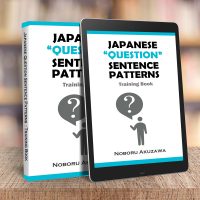Meaning: from one’s perspective; from the point of view of
Formation:
Noun + にしたら/にすれば
日本語 / にほんご / Japanese
(1) 猫にしたら、今日の夕飯は不満かもしれない / 不満かもしれません。
(2) 子供にしたら、歴史博物館めぐりはつまらないだろう / つまらないでしょう。
(3) 彼女にしたら、わたしたちの親切はかえって迷惑かもしれない / 迷惑かもしれません。
(4) 消費者にしたら、牛肉の値段は十分下がっていない / 下がっていません。
(5) 買い手にすれば、これらの食洗機の値段は高すぎる / 高すぎます。
(6) 経営者にすればボーナスは低いほうがいいが、社員にすれば10ドルでも高いほうがいい / 高い方がいいです。
ことばと表現 / Words & Expressions
めぐり【—】tour
消費者【しょうひしゃ】consumer
食洗機【しょくせんき】dishwasher
英語 / えいご / English
(1) From my cat’s point of view, he may be dissatisfied with dinner of the day.
(2) From a child’s perspective, the tour of the history museums will be boring.
(3) From her point of view, our kindness might be a nuisance instead.
(4) From the consumer’s point of view, beef prices have not gone down enough.
(5) From the buyer’s point of view, the prices of these Dishwashers are too high.
(6) From the manager’s point of view, a smaller bonus would be better, but from the employee’s point of view, even 10 more dollars would be better.
ひらがな / Hiragana
(1) ねこにしたら、きょうの ゆうはんは ふまん かもしれない / ふまん かもしれません。
(2) こどもにしたら、れきし はくぶつかん めぐりは つまらないだろう / つまらないでしょう。
(3) かのじょにしたら、わたしたちの しんせつは かえって めいわくかもしれない / めいわくかもしれません。
(4) しょうひしゃにしたら、ぎゅうにくの ねだんは じゅうぶん さがっていない / さがっていません。
(5) かいてにすれば、これらの しょくせんきの ねだんは たかすぎる / たかすぎます。
(6) けいえいしゃにすれば ぼーなすは ひくい ほうがいいが、しゃいんにすれば じゅうどるでも たかい ほうがいい / たかいほうがいいです。
ローマ字 / Roman letters
(1) Neko ni shitara, kyō no yūhan wa fuman kamo shirenai/ fuman kamo shiremasen.
(2) Kodomo ni shitara, rekishi hakubutsukan meguri wa tsumaranaidarou/ tsumaranaideshou.
(3) Kanojo ni shitara, watashi-tachi no shinsetsu wa kaette meiwaku kamo shirenai/ meiwaku kamo shiremasen.
(4) Shōhisha ni shitara, gyūniku no nedan wa jūbun sagatte inai/ sagatte imasen.
(5) Kaite ni sureba, korera no shokusenki no nedan wa taka sugiru/ taka sugimasu.
(6) Keiei-sha ni sureba bōnasu wa hikui hō ga īga, shain ni sureba jyuu-doru demo takai hō ga ii/ takai hou ga iidesu.



























No comments yet.